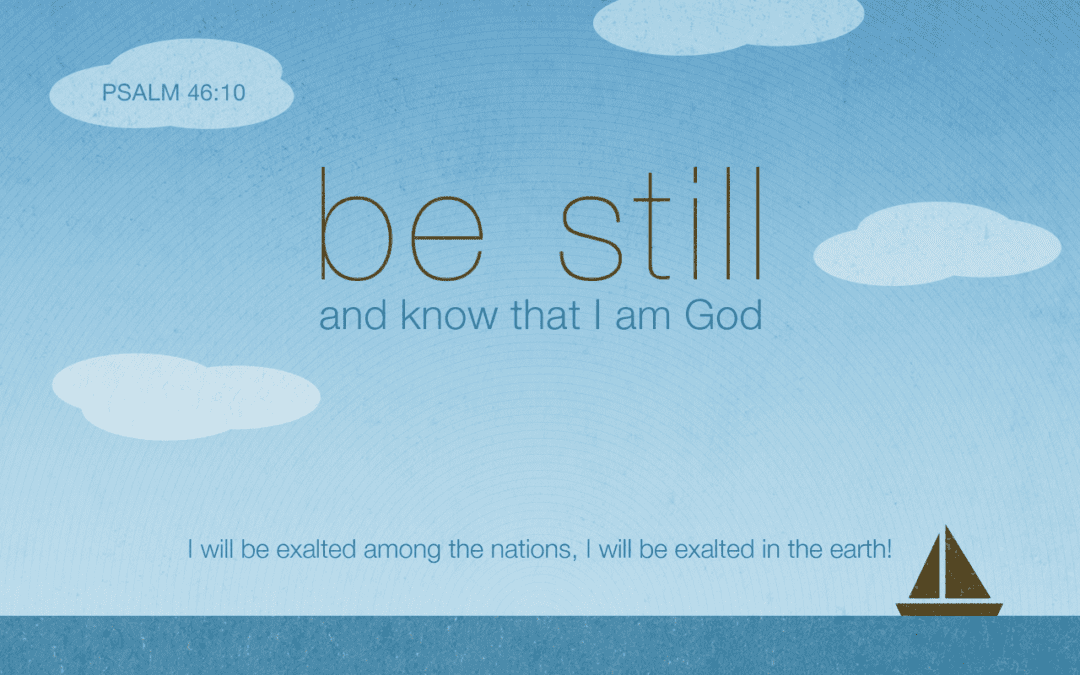God is our refuge and strength, an ever-present help in trouble. Therefore we will not fear, though the earth give way and the mountains fall into the heart of the sea, though its waters roar and foam and the mountains quake with their surging … He says, “Be still and know that I am God; I will be exalted among the nations, I will be exalted in the earth” (Psalm 46:1-3, 10).
This passage has come up a few times from a few different angles over the last week for me. I stumbled upon it again in my morning devotions this morning. The Bible I was using had a reflection in it on this particular section of the text by Mike Hyatt. I’d like to duplicate a little of what he writes as a spring board into today’s reflection. Hyatt begins his reflection as follows:
I have a difficult time turning off my mind and just being still. I seem to be more a human doing than a human being. Recently, my wife Gail recommended that I read The Joy Diet by Martha Beck. She said, “You won’t agree with everything in this book, but I think it will really challenge you — especially the first chapter.” Intrigued, I decided to read the book on my recent vacation. The first chapter is entitled “Nothing.” In summarizing the chapter, Beck says, “to begin the Joy Diet, you must do nothing for at least fifteen minutes a day.” I was so challenged by this chapter that I haven’t gotten beyond it. I have now read it four times. I have also practiced this discipline for 22 days in a row. Honestly, it has been one of the most transformational things I have ever done. Beck’s premise is that “doing nothing is the most productive activity you will ever undertake.” By doing nothing, she means literally doing nothing.
- This is not prayer (at least not in the sense of talking to God)
- It is not problem solving
- It is not planning
Doing nothing means being still, quieting your mind (and the cacophony of voices) and simply being. All the ancient wisdom literature points to the importance of this practice. (From the reflection Stillness in The NIV Bible for Men, 2015, p. 716)
“Doing nothing means being still”.
I think many of us can relate to Hyatt’s reflections: we have a difficult time turning our minds off and simply being still. Doing nothing is hard, sometimes very hard.
Being still and doing nothing seems to be just about the only thing we can do right now. With the recent announcement by the province that all non-essential services and workplaces can no longer operate during this current state of emergency in Ontario, fewer of us are heading out to work and more of us are being forced to stay at home. Like it or not, there’s not a whole lot that most of us can really do. Up until these past 2 weeks, we had many things to do; many ways to keep ourselves busy and entertained. Now all of that has been brought to a grinding halt by the global reaction to COVID-19 … and one has to wonder why.
Now, my question of “why” is not at all tied to the intricacies of human psychology, group-think, and the scientific evidence supporting the need to limit human interaction for the purposes of curbing the spread of this virus. My question is a theological one: why is God allowing this to happen?
No doubt this question has been on the minds of many, and speculations and theories abound. This situation, like many others in history, presents apparent fodder for atheists: “if God is so good and God is in control of everything, why would he allow this to happen?” Some of you may have been asked this question already. Some of you may be wondering it for yourselves. The short answer is that we are imposing our own views of what “goodness” is or what someone who is “good” would do upon our ideas of God. We assume that a “good” God would never allow pain or trouble, and would go out of his way to make sure we are the most comfortable as possible. We are also assuming, in asking the question this way, that God is in fact, some malevolent force in the heavens smiting us for apparently no good reason other than his pleasure in watching us be uncomfortable, isolated and alone, and die. The God I read about in the Bible is none of these things. The God I read of is a loving and patient parent “does not treat us as our sins deserve” (Psalm 103:10), but who also, from time to time, “disciplines us as children” (Hebrews 12:4-13) in order to shape us and transform us.
Where, then, does that leave us? We are asking the question “why” not on the level of “why would God allow this to happen?” but “what might God be trying to tell us through it?” I wonder, if perhaps, he is telling us that we need to “Be still”; perhaps we need a “Sabbath Year”.
Leviticus chapter 25 outlines God’s commands for his ancient people of Israel regarding the “Sabbath Year” and the “Year of Jubilee” and Leviticus 26 outlines the consequences for God’s people if they do not observe those commands. The concept of the “Sabbath Year” is that the earth was to lay fallow for a year and the people were not to do any harvesting or planting in order to give the land a Sabbath rest. The Year of Jubilee was celebrated every 7 Sabbath Years into the 50th year, where essentially the land was to lay fallow for 2 years. In the year of Jubilee, all land was to be returned to its rightful owners and all debts were to be wiped out. Essentially, it was a chance to hit the ‘reset button’ and allow everyone to start over again. Such a system, if followed, never allows for the rich to get richer and the poor to get poorer. It assumes a finite number of resources to be shared, and the equity and equality of all Israelites before God. Sabbath years are still observed in some pockets of Judaism, but has all but disappeared from memory for the rest of the world. The Year of Jubilee has not been celebrated in millennia, since one of the biblical preconditions for its celebration is that all 12 tribes of Israel must be living in the Land of Israel for it to be celebrated. This has not been the case since the 10 Northern tribes were exiled by the Assyrians in the 8th century B.C.E. Yet, that exile, and the subsequent exile of the southern 2 tribes in the 6th century B.C.E. were tied to Israel’s lack of observance to the practice of Sabbath, among other things. What is most interesting about that, is that God had predicted it, and outlined the consequences of that non-observance: “I will scatter you among the nations and will draw out my sword and pursue you. Your land will be laid waste, and your cities will lie in ruins. Then the land will enjoy its sabbath years all the time that it lies desolate and you are in the country of your enemies; then the land will rest and enjoy its sabbaths. All the time that it lies desolate, the land will have the rest it did not have during the sabbaths you lived in it” (Lev. 26:33–35, NIV, 2011).
But (and here’s where the loving parent steps in), God has the following advice to his people:
“ ‘But if they will confess their sins and the sins of their ancestors—their unfaithfulness and their hostility toward me, which made me hostile toward them so that I sent them into the land of their enemies—then when their uncircumcised hearts are humbled and they pay for their sin, I will remember my covenant with Jacob and my covenant with Isaac and my covenant with Abraham, and I will remember the land. For the land will be deserted by them and will enjoy its sabbaths while it lies desolate without them. They will pay for their sins because they rejected my laws and abhorred my decrees. Yet in spite of this, when they are in the land of their enemies, I will not reject them or abhor them so as to destroy them completely, breaking my covenant with them. I am the LORD their God. But for their sake I will remember the covenant with their ancestors whom I brought out of Egypt in the sight of the nations to be their God. I am the LORD.’ ” (Lev 26:40–45, NIV, 2011).
“If they will confess their sins … when their uncircumcised hearts are humbled … I will remember my covenant … for their sake”. At the end of this passage, God makes reference to his miraculous rescue of the Israelites from slavery in Egypt. While in slavery, they were forced to work long hours seven days a week with little to no rest in between. A big part of observing ‘Sabbath’ was an affront to the Egyptians and the slavery Israel endured under them. In short, God was saying: “because I have freed you from working so much, I command you to rest”. But Israel did not heed this. And so they were forced to ‘rest’ in exile. “Be still, and know that I am God. I will be exalted among the nations, I will be exalted in the earth”.
Perhaps providentially, these very familiar words from Scripture come from within a Psalm that also encourages us to trust in God when seemingly the world around us is falling apart. You may remember that when I preached on this passage a while ago, I told you that the imagery being used here is apocalyptic, end-of-the-world-as-we-know-it type imagery. Even in that situation, we are reminded that “God is our refuge and strength” and “we will not fear”. Though the COVID-19 coronavirus pandemic is not signalling the end of the world as we know it, there certainly is a lot of fear going around – some of it healthy, some of it not. In it all, we do not need to “fear” what may become of us, because we know that God is in control and that he is trustworthy and loving. He brought Israel back from exile. More than that, he sent Jesus Christ to his people, and through him brought redemption, forgiveness, and adoption as God’s children to the whole world. It is not in God’s intentions, nor in his character to utterly destroy us. But I do think he is trying to get our attention.
Perhaps it’s time we take the ‘rest’ we’ve been refusing to take. Perhaps it is time to “Be still” in the tradition of our ancestors in the faith: to actually do nothing and simply allow ourselves to be in the loving presence of our God and heavenly Father. Perhaps we need to repent and confess that we have been too busy to pay any attention to him. At this point, what do we really have to lose by doing it?
(I did investigate as to whether 2020 is supposed to be a Sabbath Year or Year of Jubilee if we extrapolate backwards to when the first ones were observed. The answer is ‘neither’).


0 Comments